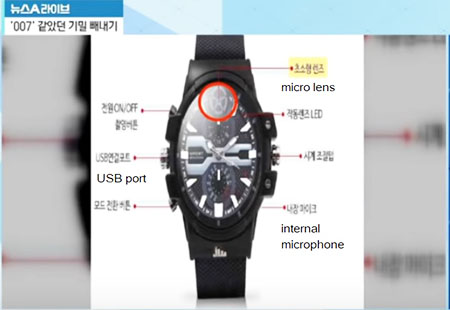by WorldTribune Staff, May 4, 2022
Using a specially-designed spy watch, South Korean operatives working for North Korea compromised a U.S.-South Korea (ROK) Command, Control, Computer, and Intelligence system located in a bunker at the Ministry of National Defense in Seoul, a report said.
A South Korean military officer and a defense contractor for IT systems were arrested for spying for North Korea in return for payments in cryptocurrency, Tara O reported for East Asia Research Center on May 3.

Officials in Seoul said police arrested an employee of a defense network maintenance contractor on April 11. The man, identified only as Mr. Lee, was charged with violating Articles 4 (Fulfilling the Purpose) and 8 (Meeting, Communication, etc.) of the National Security Act. Also arrested was an unidentified military captain on the suspicion of violating the Military Secrets Protection Act.
According to former Ministry of National Defense spokesperson Kim Min-Seok, a North Korean agent in the summer of 2021 instructed Lee to recruit an active duty military officer who could access military secrets. Lee then recruited the captain. On the North Korean agent’s orders in January of this year, Lee obtained a specialized watch with a hidden camera and listening device and mailed it to the captain for spying purposes, Tara O’s report noted.
The report continued: “Between January and March 2022, the captain hacked KJCCS (Korean Joint Command and Control System), a classified ROK system, by inserting a tainted USB stick, potentially a poison tap. A poison tap connects to the USB port, but instead of announcing itself as a USB stick, it pretends to be an ethernet interface. A backdoor is created this way to remotely access and manipulate the data on the computer network. A virus could also be inserted via the USB stick. Both hacking and providing intelligence to North Korea are gravely damaging to the national security of the Republic of Korea as well as to the U.S.”
The North Korean agent paid the South Korean operatives in bitcoin. Lee was paid ₩700,000,000 (U.S.$600,000) and the active duty captain who helped Lee was paid ₩48,000,000 (U.S.$40,000 ), South Korean police said.
Kim Kuk-Sung, formerly a senior colonel in North Korea’s General Reconnaissance Bureau and a close associate of the late Jang Song-Thaek (Kim Jong-Un’s uncle), stated that North Korean records indicate there are 120,000 North Korean spies in South Korea, including in important government organizations such as the Blue House, the National Assembly, National Intelligence Service, Ministry of Defense, and Korea Institute of Defense Analyses.
“Spying is a serious problem in South Korea, despite the public being led to believe that there are no spies in modern Korea, with the pejorative saying of ‘are there spies anymore?’ While the police should be praised for arresting the spies, catching 1 or 2 spies is not a comfort, if there are 120,000 spies infiltrated throughout the government. There needs to be better leadership and greater emphasis on this issue,” Tara O wrote.
South Korean military morale was sapped under the administration of leftist President Moon Jae-In, Tara O noted, adding that the Ministry of National Defense under the Moon regime “was not allowed to call North Korea its ‘main enemy’ anymore and that was reflected in military training by not only removing the term, but portraying North Korea as benign, despite their numerous missile and nuclear tests and other provocations.”
Moon’s last day in office was on March 9. Before he left, Tara O pointed out, Moon’s administration passed the “Complete Forfeiture of Investigative Authority of Prosecutors” law, which essentially granted self-pardons for Moon and those who served under him during his tenure.
Moon Jae-in signed it. Not surprising. https://t.co/yg1bYmIvIb
— Tara O (@DrTaraO) May 4, 2022
About . . . . Intelligence . . . . Membership
